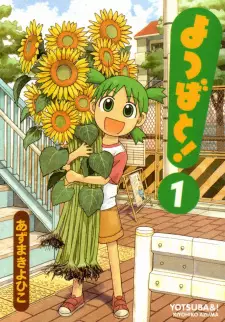Yotsuba to!

Alternative Titles
Synonyms
Japanese
English
Information
Type
MangaPublished
Authors
Azuma, KiyohikoStatus
Source
Rating
Demographics
Statistics
Rank
Score
Scored by
Popularity
Members
Favorites
External Links
Synopsis
While most people find the world mundane, five-year-old Yotsuba Koiwai sees it as a treasure trove of amazing bustle and wonderful places to explore. When she and her adoptive father, Yousuke, move to a new city, the energetic young girl naturally sets out to investigate the neighborhood on her own. After a few incidents at the local park, the Koiwais become acquainted with their neighbors, the Ayase family. Their three daughters—mischievous college student Asagi, responsible high school student Fuuka, and kindhearted grade school student Ena—eventually all take a liking to Yotsuba and join in on her antics, despite their sheer ridicule. From learning how to use a swing to figuring out how to stop global warming with air conditioners, Yotsuba's ability to infallibly find fun in everything, both amazes and annoys the people around her. Along with Yousuke, the Ayases, and friends she makes along the way, Yotsuba embarks on daily adventures, each one a step in her quest to enjoy the simple things in life. [Written by MAL Rewrite]
Background
Yotsuba to! received the Excellence Award at the 10th Japan Media Arts Festival in 2006. In 2008, the series was nominated for the 12th Osamu Tezuka Culture Award and the Eisner Award in the Best Publication for Kids category. It was also a runner-up for the first annual Manga Taishou award. In 2016, the series was awarded the 20th Tezuka Osamu Cultural Prize Grand Prize, along with Hanagami Sharaku. The first six volumes were first published in English as Yotsuba&! by ADV Manga from June 6, 2005, to October 31, 2007, before publication was discontinued. Yen Press picked up the license and has published the series since September 15, 2009. It has also been published in Spanish by Norma Editorial since November 2005; in French by Kurokawa since August 17, 2006; in German by Tokyopop since February 20, 2007; and in Polish by Kotori since May 18, 2018.